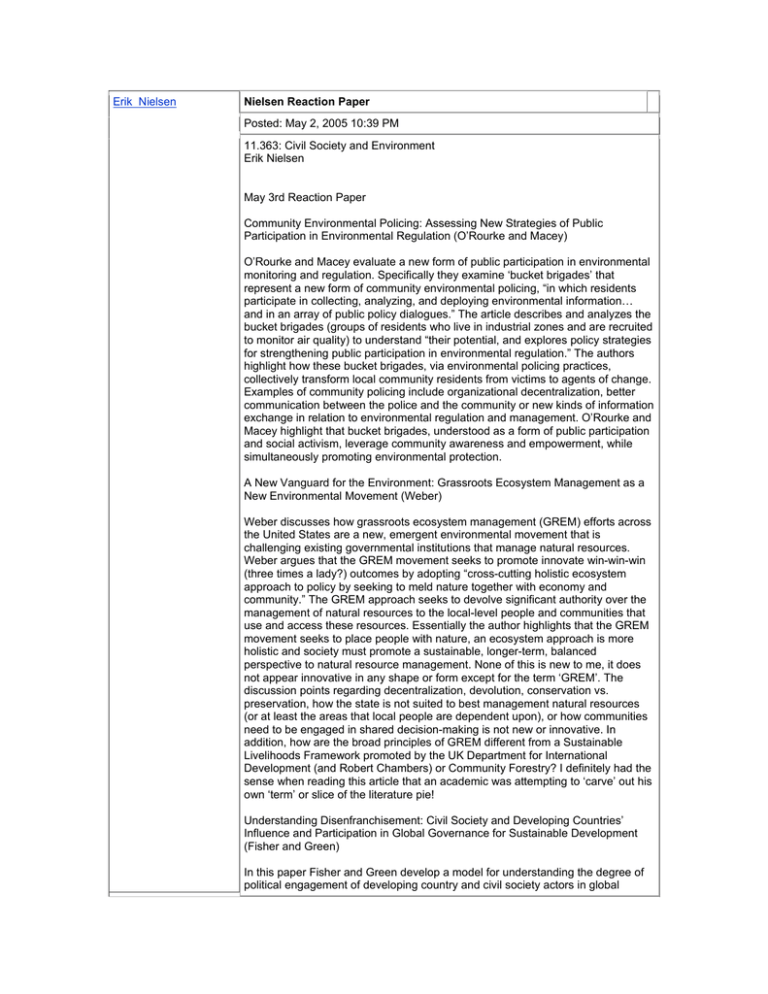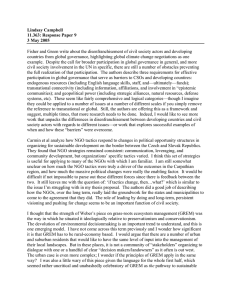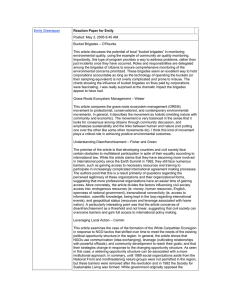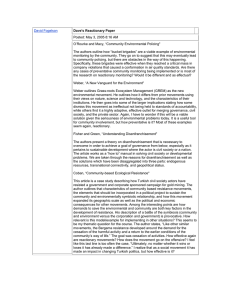Erik Nielsen Nielsen Reaction Paper Posted: May 2, 2005 10:39 PM
advertisement

Erik Nielsen Nielsen Reaction Paper Posted: May 2, 2005 10:39 PM 11.363: Civil Society and Environment Erik Nielsen May 3rd Reaction Paper Community Environmental Policing: Assessing New Strategies of Public Participation in Environmental Regulation (O’Rourke and Macey) O’Rourke and Macey evaluate a new form of public participation in environmental monitoring and regulation. Specifically they examine ‘bucket brigades’ that represent a new form of community environmental policing, “in which residents participate in collecting, analyzing, and deploying environmental information… and in an array of public policy dialogues.” The article describes and analyzes the bucket brigades (groups of residents who live in industrial zones and are recruited to monitor air quality) to understand “their potential, and explores policy strategies for strengthening public participation in environmental regulation.” The authors highlight how these bucket brigades, via environmental policing practices, collectively transform local community residents from victims to agents of change. Examples of community policing include organizational decentralization, better communication between the police and the community or new kinds of information exchange in relation to environmental regulation and management. O’Rourke and Macey highlight that bucket brigades, understood as a form of public participation and social activism, leverage community awareness and empowerment, while simultaneously promoting environmental protection. A New Vanguard for the Environment: Grassroots Ecosystem Management as a New Environmental Movement (Weber) Weber discusses how grassroots ecosystem management (GREM) efforts across the United States are a new, emergent environmental movement that is challenging existing governmental institutions that manage natural resources. Weber argues that the GREM movement seeks to promote innovate win-win-win (three times a lady?) outcomes by adopting “cross-cutting holistic ecosystem approach to policy by seeking to meld nature together with economy and community.” The GREM approach seeks to devolve significant authority over the management of natural resources to the local-level people and communities that use and access these resources. Essentially the author highlights that the GREM movement seeks to place people with nature, an ecosystem approach is more holistic and society must promote a sustainable, longer-term, balanced perspective to natural resource management. None of this is new to me, it does not appear innovative in any shape or form except for the term ‘GREM’. The discussion points regarding decentralization, devolution, conservation vs. preservation, how the state is not suited to best management natural resources (or at least the areas that local people are dependent upon), or how communities need to be engaged in shared decision-making is not new or innovative. In addition, how are the broad principles of GREM different from a Sustainable Livelihoods Framework promoted by the UK Department for International Development (and Robert Chambers) or Community Forestry? I definitely had the sense when reading this article that an academic was attempting to ‘carve’ out his own ‘term’ or slice of the literature pie! Understanding Disenfranchisement: Civil Society and Developing Countries’ Influence and Participation in Global Governance for Sustainable Development (Fisher and Green) In this paper Fisher and Green develop a model for understanding the degree of political engagement of developing country and civil society actors in global governance for sustainable development. The authors argue that ‘global’ governance is not simply an inter-state or international process, but rather includes both state and non-state actors on a multiplicity of scales. The authors specifically highlight the notion of disenfranchisement (how local actors are limited or restricted in their engagement with international regimes), and the associated factors that determine whether developing countries and civil society actors can successfully participate and influence the international arena. The authors key contribution was a systematization of how civil society and/or developing countries are excluded or hindered from participating in international policy-making process. Although other scholars have reviewed this, few (any?) have organized a framework that specifically operationalizes the dimensions of disenfranchisement, which I found very useful. Now what would be interesting is to take their framework and see how it can be applied to regional processes, such as in East Africa or the Mekong Region, and how it holds up. Leveraging Local Action (Carmin, Hicks and Beckmann) In this article the authors explore how “NGOs have become influential actors in policy and political decisions” and how “these groups can influence domestic policy and relations between states.” This article was particularly interesting and relevant to my own research given (this is broadly my own research focus in the Mekong region with China) that is demonstrates that, NGOs, even in unfavourable political environments can “gain credibility and establish a basis for [policy] action…. that they can then leverage to foster” change. This is important research as it takes place in former closed regimes. My own research will examine similar processes, but in regimes that that continue to be largely closed, beyond economic expansion and integration with the global community. The cases discussed were not transboundary in nature (i.e. rivers, trade in timber, air pollution), so I am wondering how the strategies and tactics utilized by domestic non-state actors might have shifted if the environmental problems were not only domestic in nature? In addition, I agree with Lindsay when she questions how much of the “NGO tactics were truly a driver of the outcomes in the Carpathian region, and how much the massive political changes were really the enabling factor.”




